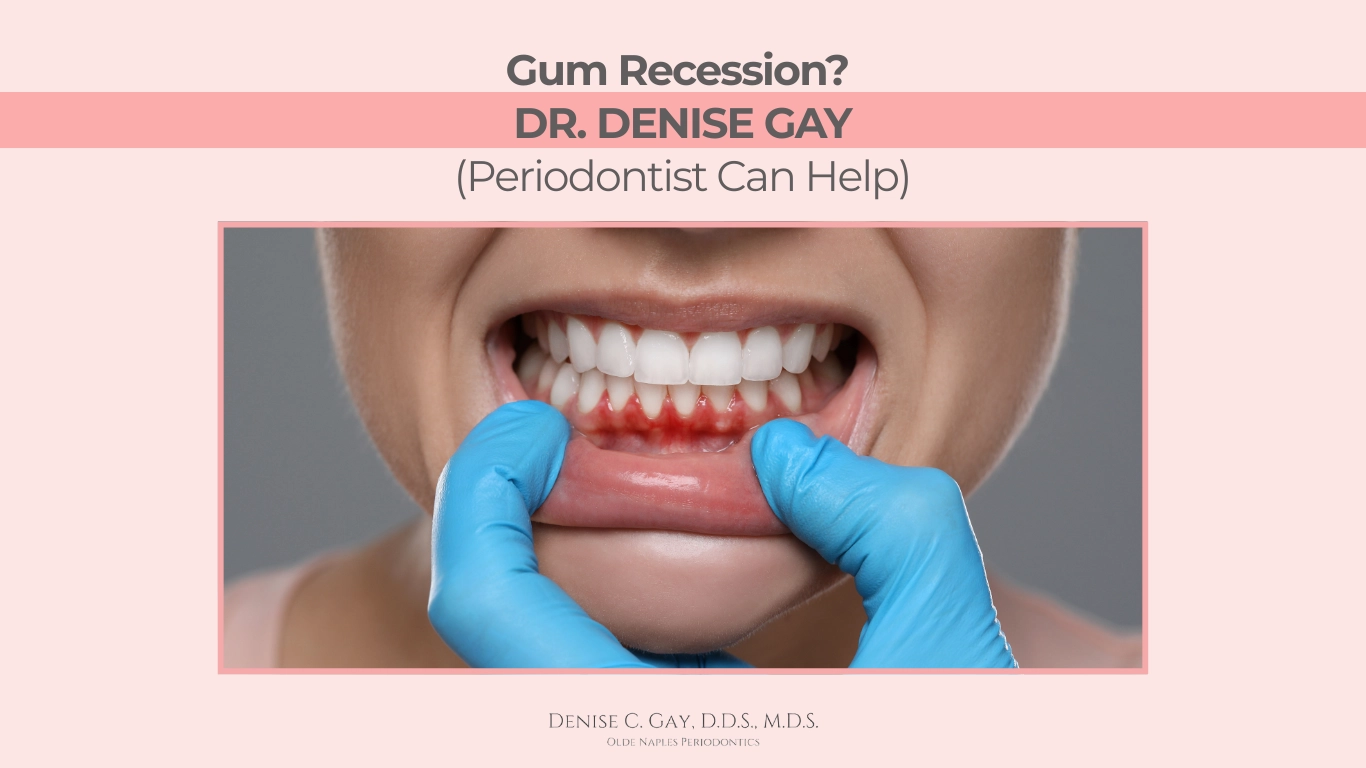
Gum recession is a common dental problem, but many people don’t notice it until the symptoms become noticeable. Although it can be concerning, there’s no need to be alarmed. At Olde Naples Periodontics, Dr. Denise Gay, an experienced periodontist, is here to help you understand and effectively treat this condition. In this blog, we’ll explain what gum recession is, how it can affect your oral health, and what treatment options are available. Additionally, we’ll provide answers to some frequently asked questions about this topic.
What is Gum Recession?
Gum recession occurs when the gums wear down and pull away from the teeth, exposing more of the tooth’s surface. This process can expose the root of the tooth, causing sensitivity and increasing the risk of infection and severe dental problems. While gum recession is common in adults, it can occur at any age if the proper precautions are not taken.
Common Causes of Gum Recession
There are several factors that can contribute to gum recession, including:
- Aggressive brushing: Using a hard-bristled toothbrush or brushing too aggressively can damage the gums, causing them to recede.
- Gum disease: Conditions like gingivitis and periodontitis can cause the gums to become inflamed, infected, and recede.
- Genetics: Some individuals are genetically predisposed to gum recession, even without poor oral hygiene habits.
- Poor dental care: Failing to maintain an adequate oral hygiene routine can lead to plaque buildup and eventually gum recession.
- Lifestyle factors: Smoking and other unhealthy habits can also accelerate the process of gum recession.
Why is it Important to Treat Gum Recession?
While many people may not experience pain or discomfort immediately, untreated gum recession can lead to serious dental health consequences. Here are some of the risks:
- Tooth sensitivity: With the exposure of the tooth roots, sensitivity to hot and cold may increase significantly.
- Increased risk of cavities: Exposed roots are more vulnerable to cavities, which could result in tooth loss if untreated.
- Advanced periodontal disease: If gum recession is caused by periodontal disease, the condition may progress and affect the bones and tissues that hold the teeth in place.
It’s essential for patients to see an experienced periodontist, such as Dr. Denise Gay, to evaluate the extent of the recession and discuss the best treatment options.
Treatment Options for Gum Recession
At Olde Naples Periodontics, we offer several treatment options for gum recession tailored to each patient’s needs:
- Gum grafting: This procedure involves taking a small piece of tissue from a healthy area in the mouth and transplanting it to the areas where the gums have receded. This helps restore the gum tissue and protect the tooth root.
- Non-surgical treatments: In some cases, Dr. Denise Gay may recommend less invasive treatments, such as topical medications and deep cleaning techniques, to control infection and stop the progression of recession.
- Regenerative therapy: If gum recession has severely affected the bone that supports the teeth, regenerative therapy can promote bone and tissue regeneration.
- Long-term maintenance: After treatment, it’s crucial to follow a dental care routine that includes regular visits to the periodontist and proper oral hygiene practices.
Is Gum Recession Treatment Painful?
This is one of the most common concerns among patients. Treatment for gum recession is generally well tolerated. During surgical procedures, local anesthetics are used to ensure that the patient is comfortable and pain-free. Additionally, Dr. Denise Gay will make sure the process is as minimally invasive as possible.
Post-Treatment Care
Once the treatment for gum recession is complete, it’s essential to maintain an adequate oral care routine to prevent the problem from reoccurring. This includes:
- Brushing with a soft-bristled toothbrush.
- Proper flossing techniques to avoid damaging the gums.
- Avoiding habits such as smoking and excessive consumption of acidic foods.
When Should I See a Periodontist?
If you notice any signs of gum recession, such as gums pulling away, longer-looking teeth, or increased tooth sensitivity, it’s important to consult a professional. Dr. Denise Gay is here to help you treat and prevent severe problems before they get worse.
Frequently Asked Questions (FAQs)
- Is gum recession reversible?Gum recession cannot be reversed, but with proper treatment, its progression can be stopped, and gum health can be restored.
- What are the symptoms of gum recession?Symptoms include receding gums, sensitive teeth, or even exposure of the tooth root.
- Can I prevent gum recession?Maintaining good oral hygiene, avoiding aggressive brushing, and visiting your dentist or periodontist regularly are the best ways to prevent gum recession.
- Is gum recession treatment expensive?The cost of treatment varies depending on the type of procedure needed, but at Olde Naples Periodontics, we offer financing options and work with insurance to make treatment more affordable.
- What happens if I don’t treat gum recession?If left untreated, gum recession can worsen, leading to tooth loss and other serious dental health issues.
If you’re experiencing symptoms of gum recession or simply want to learn more about how to prevent it, contact Olde Naples Periodontics at (239) 261-1401 to schedule an appointment with Dr. Denise Gay. Don’t wait to take care of your oral health.
